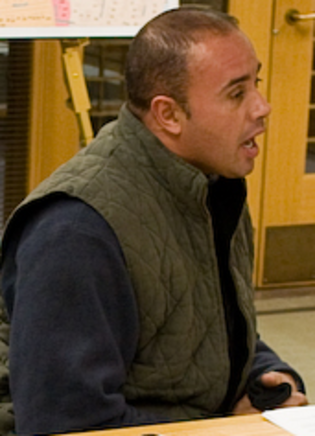 That was the cry from Fair Haven leaders like Angelo Reyes (pictured) upon learning that they’ve stopped, at least for now, a proposal for a huge River Street methadone clinic.
That was the cry from Fair Haven leaders like Angelo Reyes (pictured) upon learning that they’ve stopped, at least for now, a proposal for a huge River Street methadone clinic.
The New Haven zoning department received a letter on Tuesday from the APT Foundation, stating that the New Haven non-profit was withdrawing its request to put a 71,000 square foot drug treatment clinic in Fair Haven. The letter was received the same day that news of the proposal went public, prompting an outcry from local residents opposing a methadone clinic in their neighborhood.
“I think Fair Haven presented a unified front,” said local Alderman Joe Rodriguez. “Given the area… and given the problems Fair Haven is dealing with, it just wasn’t the right location.”
Gabriela Campos-Matteson, director of the Grand Avenue Village Association (GAVA), was one of the leaders of the opposition. Contacted by phone on Wednesday, she described the withdrawal of the proposal as a “perfect example of a community coming together and getting their voices heard.”
Campos-Matteson speculated that the APT Foundation had realized that their proposal wasn’t going to be welcomed by the neighborhood. “This wasn’t a fight they were going to be able to win.”
The APT Foundation did not respond to calls for comment.
“We won!” said Angelo Reyes, a Fair Haven developer that was against the clinic. “It’s just not what we were looking for. We’ve had enough of that.”
Calling it “one for the little guy,” Reyes said that the defeat of the proposal was a demonstration of the strength of Fair Haven. “We’re the little town that could,” he said.
With the clinic sent packing, Reyes had an eye on the future of River Street. “If I was the city I would have a master plan for the next generation,” Reyes said. The “beautiful waterfront property” would be a great location for a restaurant, or commercial space, or even a park, Reyes said.
Campos-Matteson said that GAVA, in cooperation with Yale, is doing some market research in Fair Haven to “find out what folks are interested in” in terms of new businesses. With a survey to be completed by June, Campos-Matteson hopes to be able to attract business that Fair Haveners want, instead of fighting against proposals they don’t want.
Alderman Rodriguez had some advice for developers looking to move into Fair Haven in the future: talk to the management team first.
“They need to go through the management team. They need to talk to speak to the community,” Rodriquez said. “That should be the first stop they make.”
The APT Foundation never spoke with community leaders before making its proposal. Nor did it check with the city, which has a municipal plan for River Street that was passed by the Board of Aldermen in 2002. The plan calls for a re-do of the waterfront along River Street, including the creation of a park, reconstruction of infrastructure, and the establishment of light industrial, for-profit businesses.
Given the city’s intentions for the area, Economic Development Officer Helen Rosenberg said that a drug treatment facility was not the right fit. “It doesn’t fit into the plan.”
Rosenberg said that her office had submitted a letter to the Board of Zoning Appeals opposing the project.
It just didn’t make sense, Rosenberg said, for the city to be investing money into the River Street area, only to have a non-profit operation move in and shrink the tax base.
“The over-riding goal is job creation,” Rosenberg said. With an unemployment rate approaching 10 percent, the city has been trying to attract “industrial-type” uses that will “provide jobs for unskilled and semi-skilled workers,” she explained.
The next step in the city’s River Street plan is sidestreet improvements, including tree-planting, drainage improvement, and sidewalk reconstruction. The city will also begin working soon on waterfront stabilization to prevent erosion.
Rosenberg said that River Street was due for some speedbumps to cut down on drag racing.